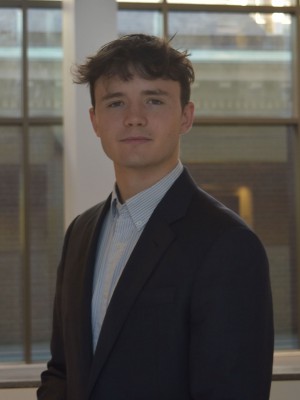Vic Student Leads Marco Research on Trump's Re-Election
By Kate Baggott
University of Toronto students created the Vertige Investment Group (VIG) to focus on training themselves, and others, to conduct financial analysis and equity research to industry standards. For third-year economics student Bruno Sullivan, that process has meant stretching into a leadership and project management role too. Last semester, Sullivan worked with a group of other undergrad students to create the Macro Research Department within VIG.

“My peers and I have now put out three, roughly 30-page, global macroeconomic reports, analyzing trends, policy decisions, and conflict impacts with our own analysis and predictions,” Sullivan explained. “We also contribute to a weekly newsletter that the club puts out on LinkedIn.”
Released in mid-November, the Macro Department’s latest report considers the global impact of Donald Trump’s re-election in the US.
The report explores how Trump’s policies could reshape North American and global trade dynamics, how Europe and Asia are responding to shifting growth patterns and how developing regions are balancing reform and resilience. It also highlights key factors expected to influence 2025, including pressures on sectors such as energy and manufacturing, the impact of geopolitics on fiscal decisions and the importance of diplomatic adjustments and policy decisions for maintaining economic stability.
Sullivan and his team move the tools and methodologies they learn about in class and apply them to the kinds of research questions that inform investors.
“We built an analyst program, teaching first-year students about the macroeconomy, its effect on investment decisions, and how they can do their own research and build reports,” the Victoria College student said.
“We use techniques such as scouring central bank releases and indicator releases for preliminary talking points and then build projections and forecasts by applying knowledge from our coursework. We also use FactSet, Bloomberg Terminal, which we were introduced to on our trip to the Bloomberg offices, and other sets for our data. Overall, we focus on bringing together a community of like-minded students who want to express their interests beyond their curriculum. It’s also a very productive way for us to continue to stay informed on current events as well as inform others through a technical lens.”
Completing the project, along with regular updates, required Sullivan and his team to develop a workflow and reporting structure that divided the work into manageable pieces.
“How I’ve split it up is we have five regions, with two or three people per region,” Sullivan said. “Each month, we go through all the main stories and macro indicators and compile them into one big global report. It’s really cool because we get to make our own predictions, whether they come true or not. That’s not something we couldn’t do as freely in an academic setting. With the weekly Market Pulse, we have a lot of readers now, which is especially cool. Despite all our commitments, people are still able to contribute.”
Even with clearly defined expectations and contributions, producing 30- to 40-page research reports in addition to coursework during term is no easy feat. Sullivan drew on his experience as a member of the Varsity Blues Men’s Soccer Team to build the group’s macro department, but the experienced team player had to stretch into a leadership role he was unaccustomed to.
“I’ve never been a leader of a team before, so learning how to hold people accountable has been a big part of this experience,” he said. “It’s incredible to see how much better people are getting at writing and meeting deadlines. Despite all our commitments, people are still able to contribute, and it’s something they really want to do. Working on this project has taught me about teamwork and leadership. It’s different from a class setting because we publish on our own time and get everything together as a team. Applying the academic frameworks and models we’ve learned in courses to real-world predictions has been really cool.”
This article is courtesy of the University of Toronto Department of Economics.
